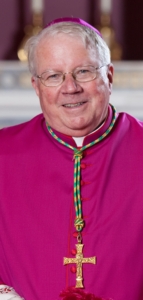Bishop Kennedy appointed to Anglican dialogue commission
BRAINTREE -- Bishop Arthur Kennedy has been appointed by the Vatican to participate in an ecumenical dialogue with the Anglican Communion this spring.
Bishop Kennedy, who is the rector of St. John's Seminary, has been named by Pope Benedict XVI to participate in the next phase of the Anglican-Roman Catholic International Commission (ARCIC), the Catholic Church's official dialogue with the Anglican Communion.
He has previously served as the executive director of the Secretariat for Ecumenical and Interreligious Affairs for the United States Conference of Catholic Bishops.
"It's a very great honor to be able to do that, and a responsibility," Bishop Kennedy said.
Bishop Kennedy, along with other Catholic and Anglican officials, will participate in meetings of the third phase of the dialogue from May 17 to 27 at the Monastery of Bose in northern Italy. Bishop Kennedy said subsequent meetings will take place over the coming years.
Co-chairmen for the session are the Catholic Archbishop of Birmingham, England Bernard Longley and Anglican Archbishop David Moxon of New Zealand.
The ARCIC has been an ongoing 40-year official dialogue between the Catholic Church and the Anglican Communion that has considered theological and historical aspects of the two faith traditions.
This third phase of ARCIC was mandated by Pope Benedict XVI and the Archbishop of Canterbury, Rowan Williams, at their 2009 meeting in Rome.
Bishop Kennedy said that meetings in this phase of the ARCIC are likely to consider anthropological perspectives on marriage, the family and ordination practices that differ between the two faiths. As an example, Bishop Kennedy cited the Anglican practice of ordaining women priests and the more recent practice of ordaining women bishops.
"Those questions are going to be part of this dialogue, which is a different kind of dialogue than had existed in the past," Bishop Kennedy said.
Catholic officials have cited other obstacles such the ordination of an openly gay bishop in the United States and the decision of some Anglican dioceses to recognize same-sex unions.
From the Anglican perspective, obstacles to reunification include questions over papal authority and infallibility, as well as dogmatic questions about the Immaculate Conception and the Assumption.
Prior conversations have included theological and historical dimensions, Bishop Kennedy said.
Specifically, he cited a prior dialogue on the Virgin Mary, which he said "created very valuable methodology for ecumenical communication."
Bishop Kennedy said the commission considered teachings on Mary over the first 1,500 years of Christianity, and what happened when the two traditions split roughly 500 years ago. He said the effort explored the prospects of reaching a common understanding in the future.



















